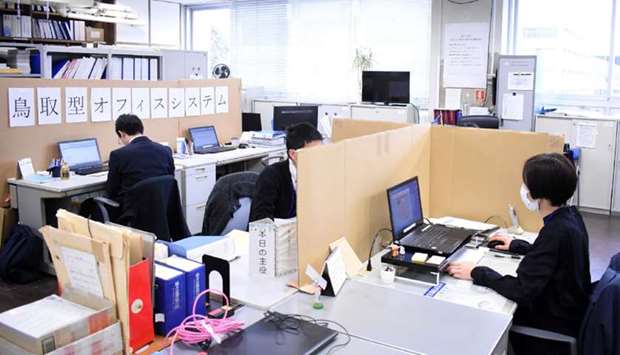Facing calls to declare a coronavirus state of emergency, Japanese Prime Minister Shinzo Abe was derided on social media yesterday for instead offering people cloth masks, pointing to growing frustration with his handling of the crisis.
Abe’s offer of free masks – two per household – came the day after experts had warned Japan was on the brink of a medical crisis as cases rose, especially in Tokyo. The prime minister said on Wednesday Japan was “barely holding the line” in its battle against the virus.
The prime minister launched his offer to send cloth masks out while wearing one at a meeting of a government task force late on Wednesday. The masks will be sent to all of Japan’s more than 50mn households starting the week after next, first to areas seeing a spike in cases.
“You can use soap to wash and re-use them, so this should be a good response to the sudden, huge demand for masks,” he said. Twitter users were scathing, with Abe and mask references trending. “Is the Japanese government for real? This is a total waste of tax money,” wrote a user with the handle Usube.
It is not the first time Abe has faced criticism for his coronavirus strategies.
Some have said his initial response to the virus was sluggish, with charges from critics that he played down the threat in the hope that Tokyo could go ahead and host the now-postponed Summer Olympics this year.
Abe denied that. Critics say he should act now on a state of emergency, fearing a spike in infections after crowds gathered in some places for traditional cherry-blossom viewing parties last month, despite calls to stay at home.
Abe’s wife, Akie, was blasted after pictures emerged of her at one such event, but Abe defended her, saying it was a private gathering at a restaurant.
Though small compared with outbreaks in the United States, Europe and China, coronavirus infections are on the rise in Japan — with more than 2,600 confirmed cases and 71 deaths as of Thursday, according to NHK. A record 97 new cases emerged in Tokyo alone, its biggest one-day increase, the public broadcaster said.
But Abe says it is not the time to declare a state of emergency, which would give authorities the legal might to urge residents to stay at home, close schools and take other steps. Opinion polls suggest the country has been divided on his crisis stances, with his approval rating having recovered to just shy of 50% in mid-March. Japanese law does not mandate penalties for those who ignore most lockdown-style requests, unlike in some other countries, but does allow expropriation of buildings or land for medical facilities.
Abe’s ruling party has long called for revising the constitution to insert an emergency powers clause that critics say would infringe on civil rights. But he has been wary of invoking watered-down restrictions authorised in a law revised last month.
The leader of the opposition Democratic Party for the People, Yuichiro Tamaki, this week called on Abe to declare a state of emergency, while the Japan Medical Association pointed to a crisis at hospitals in some regions, where beds for virus patients are full and doctors and nurses are getting infected.
“Abe has always been ‘economy first’,” said Jesper Koll, CEO of fund manager WisdomTree Japan. The prime minister returned to power in 2012 promising to revive growth with a policy mix dubbed ‘Abenomics’, and he has promised a huge fiscal package to counter the outbreak’s blow to the economy. “If you declare an emergency, it is definitely the end of ‘Abenomics’, the end of ‘economy first’,” said Koll. Meanwhile, back on Twitter, the premier’s offer of two masks per household was the object of particular scorn. A commenter using the Twitter handle Yosuke asked, “If your family has more than two people, what are you supposed to do — fight over them?”

Office employees use cardboard partitions to separate their desks amid concerns over the coronavirus, at the prefectural government office in Tottori, western Japan.
